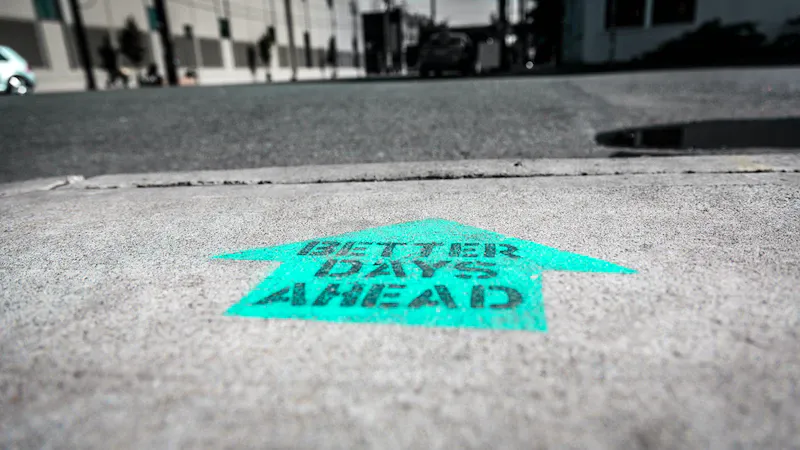Hugging Hope: The Power of Optimism

The Cynicism Trap: How Negative Thinking Shapes Our Reality
Have you ever noticed how our thoughts and beliefs have the power to shape our reality? It’s something that I’ve come to realize through my own experiences and observations. The way we perceive the world and the stories we tell ourselves can have a profound impact on our lives and the lives of those around us.
One particular trap that many of us fall into is the cynicism trap. Cynicism is the belief that humanity is inherently greedy, selfish, and dishonest. It’s a negative outlook that leads us to mistrust others and view the world as a zero-sum game, where someone’s gain must be someone else’s loss.
But here’s the thing: cynicism doesn’t actually help us see reality more clearly. In fact, it distorts our perception and creates a self-fulfilling prophecy. When we believe that everyone is out for themselves, we stop seeing acts of kindness and cooperation. We become closed off, refusing intimacy and collaboration, and hurting others to protect ourselves from being hurt.
Research has shown that cynics often perform less well in cognitive tests, earn less money, and have difficulty in negotiations. They even struggle to spot genuine acts of deception in others. By mistreating others, cynics inadvertently create the very conditions they fear.
Our stories about each other become self-fulfilling. If we constantly paint a picture of a world filled with villains, we end up living in that world. It’s like being stuck in quicksand, sinking deeper the more we struggle.
But here’s the good news: we don’t have to accept cynicism as our default mindset. We have the power to take control of our stories and shape a more positive reality. My own research has shown that acts of generosity and empathy not only benefit others but also increase our own happiness.
By recognizing that empathy is a strength, not a weakness, we can bridge the divide between people with differing beliefs and foster understanding. When we choose empathy and cooperation over cynicism, we can make a real difference in our relationships, lives, and even our culture.
It’s important to acknowledge that cynicism is not the sole root of our problems, and optimism alone will not solve them. However, by hugging a more hopeful outlook and actively seeking out acts of kindness and cooperation, we can create pockets of solidarity and mutual aid.
Together, we can build miniature “ocean villages” where trust, collaboration, and compassion flourish. These pockets of positivity can grow and eventually contribute to a better future for all.
So, the next time you find yourself succumbing to cynicism, remember that it’s a psychological quicksand that pulls you deeper the more you struggle. Fight to believe in the inherent goodness of people, not because it feels good, but because the stories we tell ourselves matter.
Let’s reach out and help others who may be stuck in cynicism, lifting them up until more of us can find solid ground. Optimism is not a relic of the past; it’s a key to building a brighter future by allowing us to see it more clearly.
Together, we can escape the cynicism trap and shape a reality filled with hope, kindness, and progress.
Escaping the Cynicism Trap: Rediscovering the Power of Optimism
Have you ever felt overwhelmed by the negativity that seems to surround us? It’s easy to fall into the cynicism trap, where we view the world through a lens of mistrust and pessimism. But what if I told you that there’s another way—a path towards rediscovering the power of optimism?
Throughout my own journey and based on the insights gained from psychological research, I’ve come to realize that cynicism is not a system upgrade that allows us to see reality more clearly. Instead, it acts as a mental malware, poisoning our relationships, lives, and culture.
But here’s the thing—we don’t have to accept cynicism as our default mode of thinking. We have the ability to take control of our stories and shape a different reality, one that is filled with hope, kindness, and progress.
It’s important to acknowledge that cynicism is not the sole cause of our problems, and optimism alone won’t magically fix everything. However, by hugging an optimistic outlook and actively seeking out acts of kindness and cooperation, we can create a ripple effect that positively impacts our lives and those around us.
Research has shown that acts of generosity and empathy not only benefit others but also increase our own happiness. By choosing to believe in the inherent goodness of people, we open ourselves up to a world of possibilities and create an environment where trust and collaboration can thrive.
It’s true that our social world shapes us, molding us into either hopeful or cynical versions of ourselves. In times of crisis and disaster, cynicism can spread like wildfire, further fueling the negative cycle. But we can break free from this trap by consciously reframing our narratives.
Imagine a world where we acknowledge the struggles and injustices that exist, but also recognize the capacity for change and growth. By focusing on solutions, collective action, and building bridges of understanding, we can create a better future.
Optimism doesn’t mean turning a blind eye to the challenges we face; it means approaching them with the belief that positive change is possible. It’s about finding the courage to challenge the status quo, to seek common ground, and to extend a helping hand to those who need it.
So, the next time you feel yourself slipping into cynicism, remember that it’s not a reflection of reality. It’s a perspective shaped by our stories and beliefs. Choose to tell a different story, one that inspires hope, compassion, and unity.
Together, let’s escape the cynicism trap and embark on a journey towards a more optimistic future. By caring our collective optimism, we can create a world where kindness, understanding, and progress flourish.
It won’t be easy, and there will be obstacles along the way, but with every small step we take towards optimism, we contribute to a brighter and more compassionate world for ourselves and future generations.
The Power of Empathy: Transforming Cynicism into Hope
Have you ever wondered how empathy can be a catalyst for positive change in our world? It’s something I’ve witnessed firsthand, and it has shown me that empathy has the remarkable ability to transform cynicism into hope.
In our current reality, it’s easy to succumb to cynicism. We are bombarded with negative news, faced with societal divisions, and witness acts of greed and injustice. It’s no wonder that cynicism has become an epidemic, infecting even those who strive to see the good in humanity.
But here’s what I’ve discovered through my research as well as personal experiences: empathy is a powerful antidote to cynicism. When we step into someone else’s shoes, when we truly understand and share their feelings, something remarkable happens. We begin to break down the walls of mistrust and build bridges of connection.
My lab and I have delved into the science behind empathy, and the findings are fascinating. We’ve discovered that acts of kindness and helping others not only benefit those we assist but also have a profound impact on our own well-being.
Think about it—giving away money can activate the same pleasure centers in our brains as indulging in a delicious piece of chocolate. Helping others navigate through their stress and challenges can bring a sense of calm and fulfillment to our own lives. It’s a powerful reminder that there is inherent goodness in us, and it has the potential to do immense good for ourselves and our communities.
However, there came a point in my journey when the weight of cynicism started to take its toll. I found myself preaching the importance of kindness and human connection while secretly succumbing to a sense of disillusionment. I felt like a fraud, a promoter of something I no longer believed in wholeheartedly.
But here’s the pivotal realization that turned things around for me: cynicism is not an upgrade that allows us to see reality more clearly. It’s a trap, a mental quicksand that pulls us deeper into a world we don’t want to live in. It blinds us to the kindness and compassion that exist all around us, perpetuating a self-fulfilling prophecy of mistrust and isolation.
Fortunately, I discovered that we have the power to break free from this trap. We can choose empathy over cynicism, even in the face of adversity. By hugging empathy, we not only improve our own well-being but also foster a more compassionate and understanding society.
Empathy is not about naively believing that everyone is perfect or ignoring the struggles and injustices that exist. It’s about recognizing that we all have the capacity for growth, change, and connection. It’s about acknowledging the pain of others and extending a helping hand, even when it seems easier to turn away.
Through my studies, I’ve seen how empathy can bridge ideological divides and grow meaningful relationships. When we step outside our comfort zones, listen to different perspectives, and engage in genuine dialogue, we can find common ground and work towards a more united future.
But empathy is not just a force for individual transformation; it has the power to shape our collective reality. When we choose empathy, when we believe in the goodness of humanity, we contribute to a narrative that inspires hope and compels others to act with kindness and compassion.
So, the next time you find yourself trapped in cynicism’s grip, remember the transformative power of empathy. Reach out a hand to someone in need, listen without judgment, and hug the belief that we can create a better world by understanding and caring for one another.
Together, let’s break free from the cynicism trap and build a future where empathy reigns supreme. It won’t be easy, but the journey towards hope and compassion is one that’s worth embarking on.
Building a Better Future: The Role of Optimism in Shaping Society
Imagine a world where optimism is not just a fleeting sentiment but a driving force behind societal change. It may seem like a distant dream, but I firmly believe that optimism plays a crucial role in building a better future for all.
Our current reality is filled with challenges. We face global crises, deep-seated divisions, and a growing sense of cynicism. It’s easy to feel overwhelmed and question whether optimism has any place in such a tumultuous world. However, I urge you to consider the power of positive thinking and its transformative impact on society.
Optimism is not about turning a blind eye to the issues we face. It’s about recognizing the potential for growth, progress, and collective action. It’s about believing that, despite the obstacles, we have the capacity to create a world that is fairer, more just, and filled with opportunity.
But how can optimism shape society? The answer lies in the stories we tell ourselves and the narratives we choose to believe. When we view the world through a lens of optimism, we open ourselves up to new possibilities and inspire others to join us on the path towards positive change.
Optimism doesn’t mean denying the existence of problems; it means approaching them with a mindset focused on finding solutions. It means hugging innovation, empathy, and collaboration as we tackle the complex issues that lie before us.
Think about the impact of collective optimism. When individuals come together with a shared vision for a better future, amazing things can happen. We’ve witnessed this throughout history—from civil rights movements to scientific breakthroughs. Optimism fuels the determination and toughness needed to overcome seemingly insurmountable challenges.
However, optimism alone is not enough. It must be accompanied by action. We must actively work towards creating the change we envision. By engaging in grassroots initiatives, advocating for justice and equality, and supporting causes that align with our values, we can contribute to a more optimistic and inclusive society.
But let’s not forget the importance of hope in our personal lives as well. Optimism nourishes our own well-being, allowing us to navigate through difficult times with toughness and a belief in our own potential. It helps us grow a positive mindset that radiates to those around us, creating a ripple effect of positivity.
So, how can we hug optimism and play our part in shaping a better future? It starts with a shift in mindset. We need to challenge the notion that pessimism is the default response to the world’s problems. Instead, let’s choose to be the architects of optimism.
Let’s seek out stories of hope and toughness, increasing voices that inspire positive change. Let’s support and collaborate with organizations and individuals who are working towards creating a more equitable and sustainable world.
And perhaps most importantly, let’s instill a sense of optimism in future generations. By caring their belief in their own power to make a difference, we set the stage for a future driven by hope and collective action.
Optimism is not a mere abstract concept; it’s a force that can shape the trajectory of our society. So, let’s come together, armed with optimism, and build a future where compassion, progress, and equality thrive.
Conclusion
As we come to the end of this exploration into the power of optimism and empathy, let’s reflect on the profound impact these qualities can have on our lives and society as a whole.
We’ve learned that cynicism is not an upgrade that provides clarity but rather a trap that distorts our perception of reality. It hampers our ability to connect, collaborate, and find common ground. On the other hand, optimism opens doors to new possibilities and fuels our determination to create positive change.
By choosing empathy over cynicism, we bridge divides and foster understanding. Acts of kindness and compassion not only benefit others but also contribute to our own well-being. Empathy reminds us of our shared humanity and the power we hold to shape a more inclusive and compassionate world.
Furthermore, hugging optimism doesn’t mean turning a blind eye to the challenges we face. It means recognizing that we have the capacity to overcome obstacles, find innovative solutions, and create a brighter future. Optimism is a force that propels us forward, infusing our lives with toughness, hope, and a belief in our own potential.
It’s important to remember that optimism is not a solitary endeavor. We must actively engage with others, collaborate, and support causes that align with our values. Together, we can create a collective momentum that inspires positive change and shapes a society built on justice, equality, and opportunity.
So, as we navigate the complexities of our world, let’s choose optimism. Let’s care empathy, kindness, and compassion within ourselves and extend them to others. Let’s tell stories of hope, increase voices that inspire, and take action towards building a better future.
By hugging optimism and empathy, we can break free from the cynicism trap and shape a reality filled with hope, understanding, and progress. It won’t be an easy journey, but it’s one that’s worth embarking on—for ourselves, for future generations, and for the betterment of our world.




